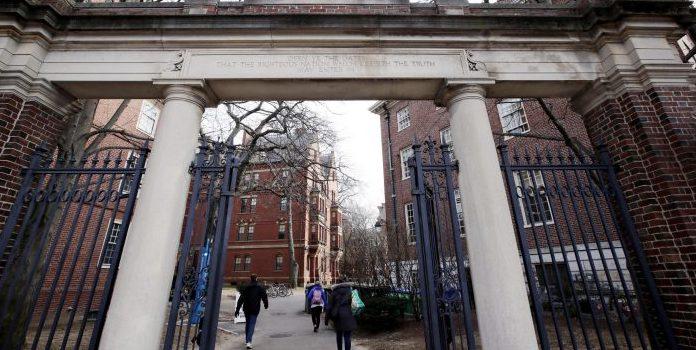(Headline USA) In yet another sign of the ongoing dumbing-down of America for the sake of so-called inclusion and equity, Harvard University is dropping SAT and ACT scores as part of its student application process.
The policy will remain in place for at least the next four years, the Ivy League school announced Thursday, extending a policy many colleges have adopted during the pandemic and that a growing number are keeping for years to come.
Harvard announced in 2020 that standardized tests would be optional for a year as students faced limited access to testing sites. It later extended the policy for another year, and this week said tests won’t be required through 2026 amid continued challenges, not to mention falling revenue.
William Fitzsimmons, the school’s dean of admissions, said students who do not submit test scores will not face any disadvantage in the application process.
“Their applications will be considered on the basis of what they have presented, and they are encouraged to send whatever materials they believe would convey their accomplishments in secondary school and their promise for the future,” he said in a statement.
Harvard joins a growing number of colleges moving to extend the policy for future years.
The University of Wisconsin announced last week that test scores will remain optional through the spring 2025 semester. Last month, Stanford University extended its policy through the 2022-23 school year. Miami University in Ohio recently extended a policy through spring 2023.
Some other colleges say they are permanently moving away from standardized tests amid criticism that the exams favor wealthy, white applicants and disadvantage minority and low-income students. That’s a coy way of saying those institutions of alleged higher learning are bending a knee to the woke mob, ranking political correctness above academic achievement.
The University of Kansas on Wednesday created a pathway to admit students without taking exams as long as they have a high school grade point average of 3.25 or better.
In announcing the change, Chancellor Douglas Girod said the policy was initially spurred by the pandemic but that “people were figuring out quickly that these tests were creating barriers.”
The University of California system became the largest higher education institute in the U.S. to abandon test scores this year as part of a court settlement. Facing a lawsuit from students and groups who said the SAT and ACT are biased against students of color, the system opted to stop considering test scores entirely.
The organizations behind the SAT and ACT have denied allegations that their tests are biased.
In January, the governing board of the 480,000-student California State University system plans to consider a proposal to make test scores optional after a state board recommended it. On Wednesday, the system’s chancellor told The Los Angeles Times he would support the move.
The pandemic has accelerated the number of colleges moving to make tests optional — at least on a temporary basis — but even before COVID-19, more were moving in that direction amid concerns about equity and access to college. Also likely in the mix driving those decisions were falling enrollment rates and declining revenues, as it became increasingly clearer during the pandemic that a decent education could be achieved without plopping down $30,000-plus a year for tuition.
The fairness of standardized tests came under renewed scrutiny in 2019 as investigators revealed that, as part of a sprawling college admissions scandal, some wealthy parents had paid to cheat on their children’s exams. Some colleges dropped their requirements in the wake of those revelations.
Bob Schaeffer, executive director of the FairTest anti-testing group, said that, as more schools drop requirements, they’re finding they attract more applicants with better academic qualifications and wider diversity.
By his group’s count, three-fifths of all U.S. colleges have committed to make exams optional or to ignore scores entirely for applicants in fall 2023. Schaeffer said he expects that figure to continue growing.
In a statement, he said “evaluating undergraduate applicants without test scores is here to stay.”
Adapted from reporting by the Associated Press

